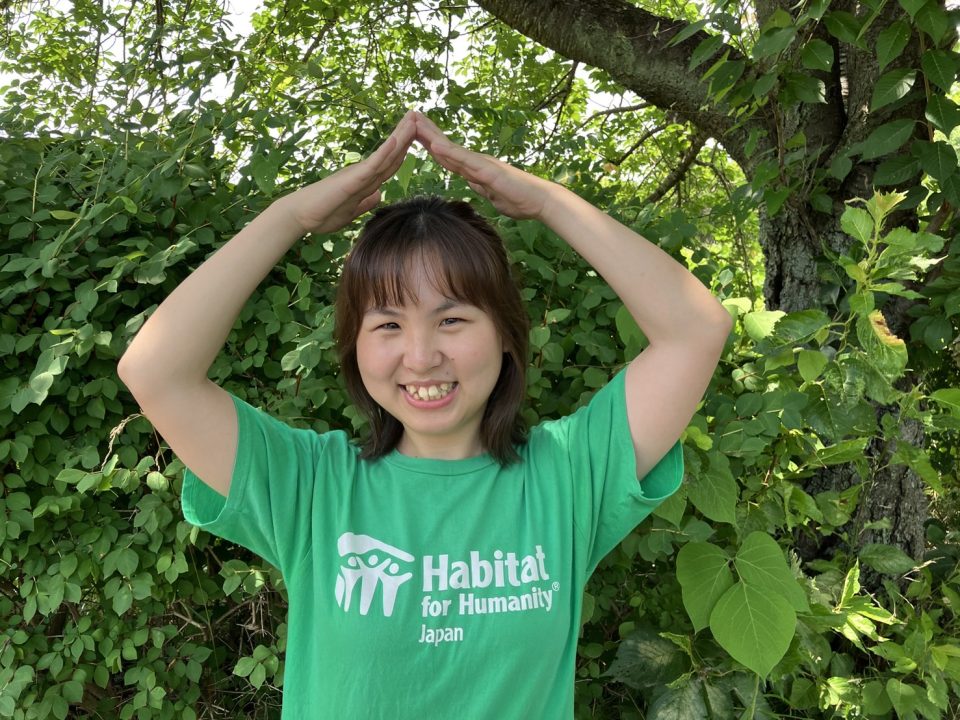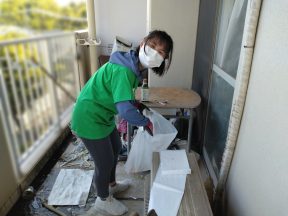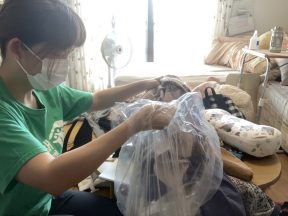With the help of volunteers, Habitat Japan’s domestic housing support program “Project HomeWorks” (PHW) supports those in Shinjuku and 6 other Tokyo wards who find it difficult to improve their living environment on their own. So we may continue conducting two to four PHW sessions each month, Habitat is looking to hire a new volunteer coordinator. Please check here for details (Japanese)
We interviewed Ms. Tang, who has worked as a volunteer coordinator for a year and a half about her experience with the job.

Q: What made you want to work as a volunteer coordinator for PHW?
I’m going to university for urban planning. I’ve always been interested in creating environments where people can live comfortably, especially an environment as foundational as one’s home. I think having a safe and decent place to live is a basic human right. From what I’ve learned and experienced, to enrich people’s minds and livelihoods, it is essential that people have a decent environment to live. Through PHW, I want to help people who aren’t able to live decently to improve their living environment, and that’s why I applied for this position.
Q: What have you learned as a PHW coordinator?
I’ve visited the homes of about 20 home partners so far, and helped them clean and tidy their homes alongside volunteers. Making conversation as we work, I’m often able to learn about the home partner– what kind of jobs they’ve worked, their hobbies, and other happy memories. Hearing about what kind of lives they’ve led, it makes me think about how easy it is for things like illness or injury to put a wrench in things and ultimately cause the quality of one’s living environment to deteriorate. Unfortunate circumstances can affect anyone, even our friends, family, and neighbors. For people in a rough situation, it can be impossible to get out of it on their own and they just need someone to help them get things under control. A lot of people unfortunately don’t have people close to them that they can turn to for help, and unfortunately they and their plight end up hiding in plain sight. Through this job, I learned just how many people are struggling on their own and came to see it as a pressing social issue, which has become an invaluable learning experience.
Q: What is your most memorable experience on the job?
We visited a home partner with a mental illness several times. On the last day, they told us that with their living environment sorted, they are able to think positively about the future. They then went on to share with us all of the things that they wanted to give a try from then on. Hearing this, it made me glad to think that by offering our support, however small, was an important part of the home partner being able to make positive steps towards the future.
On the other hand, there was one home where I found it difficult to improve the living space. The household was an elderly person living all alone. We visited during the summer and I was shocked to see how hot, cramped, and run-down their room was. I could hardly imagine what it must be like to wake up every day in that environment every day. There’s a limit to how much we can do to help over one session, but no matter how short our time is I want to make the best of each visit and work with volunteers to create the biggest positive impact for our home partners possible, even if it’s hard work.
Q: What do you keep in mind / what do you have to be careful of during a PHW session?
When we visit a home partner, I try to understand the whole of their background and their life to date, not just their current housing situation. I also try to create a friendly atmosphere where volunteers and home partners feel comfortable with one another even though for most sessions it’s their first time meeting. Our volunteers range from students to working adults to retirees. I enjoy PHW a lot personally. It offers me a chance to meet people and learn new things that I never would be able to otherwise. Conversations between volunteers and home partners can be very deep and engaging, and I’m happy to work to help create that environment where people may exchange and understand one another.
Habitat Japan continues to support those in need of safe and decent places to live in Tokyo through Project HomeWorks. We are eagerly awaiting applications for our PHW coordinator position, and as always welcome the kind participation of volunteers.


